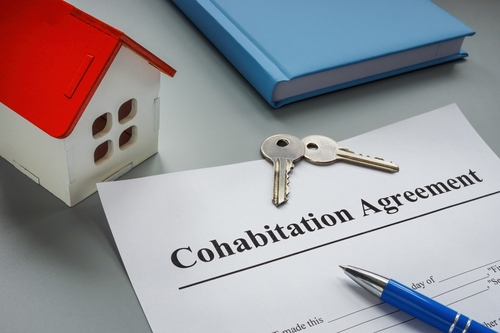Unmarried couples have far fewer rights than married couples, which can result in difficulties if you separate. A cohabitation agreement helps to ensure that you start a relationship on an open and honest footing, knowing that you will have the financial certainty that you need, should anything happen.
A cohabitation agreement can also reduce the risk of disputes or misunderstandings arising in your relationship, giving you both a clear understanding of your position and financial rights and responsibilities.
What goes into a cohabitation agreement?
You can deal with a range of issues in a cohabitation agreement, tailoring it to suit your unique circumstances. Matters that are regularly included are:
- How property is owned, to include a home you may share and previously owned properties
- Who will pay the mortgage or rent
- What will happen to savings and investments, should you separate
- Who is responsible for paying bills and other outgoings
- How debts are to be dealt with, to include debts accrued before you became a couple
- Financial provisions for children
- Ownership of valuable items you may acquire or already own
- Sharing of pensions
- What will happen to pets in the event that you separate
Is a cohabitation agreement legally binding?
The courts will generally follow the terms of a cohabitation agreement, provided it is satisfied on certain points, including the following:
- The agreement has been drafted and executed as a deed
- Both parties have taken independent legal advice as to the implications of the agreement before signing
- They both understand the effects of entering into the agreement
- The provisions of the agreement meet the needs of both parties and the agreement is fair
- Neither party was under any pressure or duress to sign
- Both parties have made full financial disclosure to each other before the agreement was drawn up
The advantages of a cohabitation agreement
As well as encouraging openness and honesty, a cohabitation agreement gives the parties a chance to consider their financial position for the future and to try and ensure that both of them are treated fairly. This can be particularly important if, for example, one of them is likely to give up their career to raise children.
It also reduces the scope for disputes during the relationship, by ensuring that both parties clearly understand their rights and responsibilities.
In the event that a couple does separate, the existence of a cohabitation agreement can make the process much simpler and less contentious than it might otherwise be.

How we can help
If you need help with a family matter, our team of professionals are here to help you and guide you through the process.
Abigail Roode is a Trainee Solicitor in our Family Department, please contact Abigail; [email protected] or call 01271 340499
Wollens has offices in Torquay, Exeter and Barnstaple in Devon.



